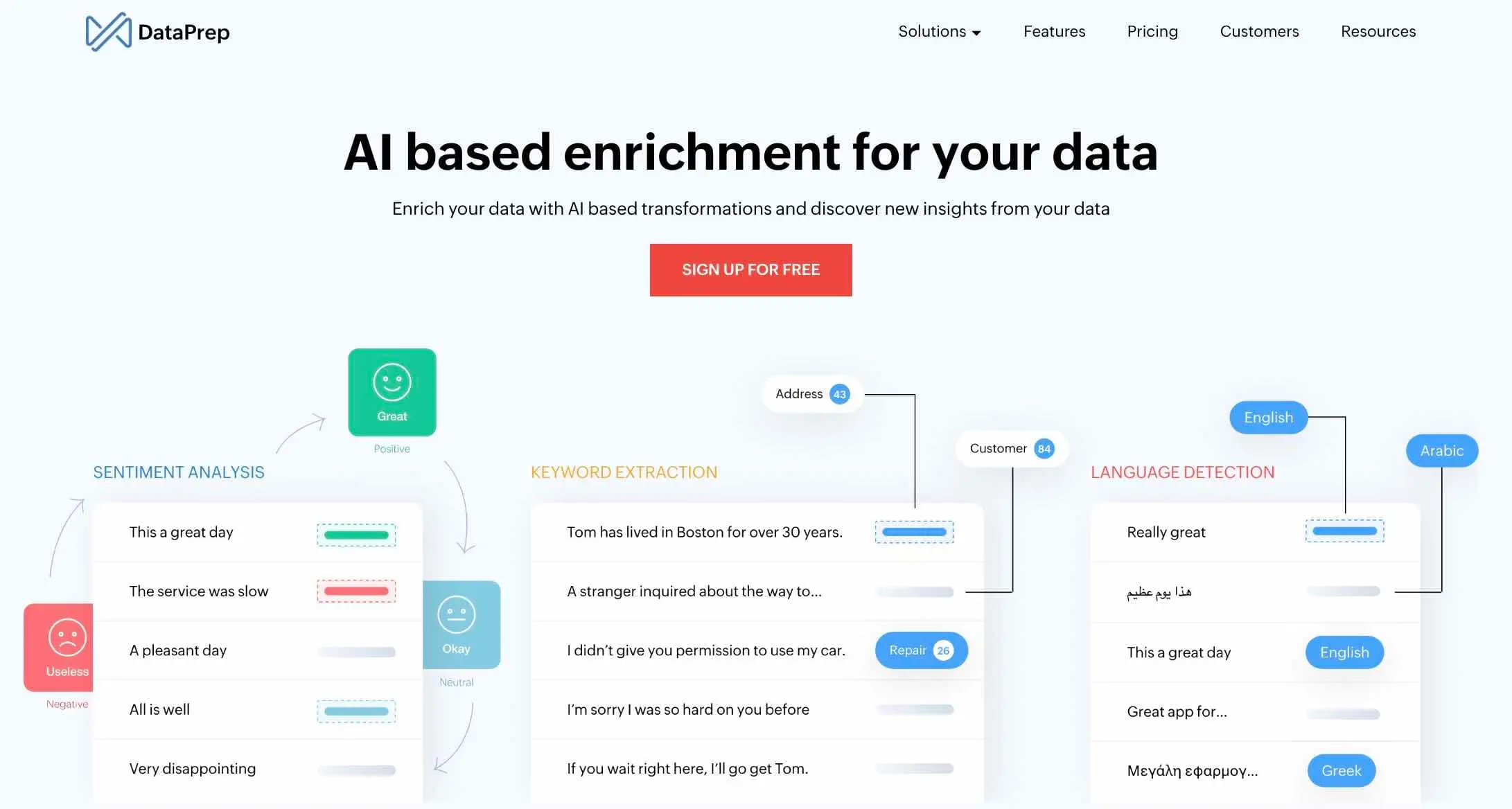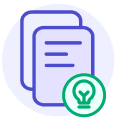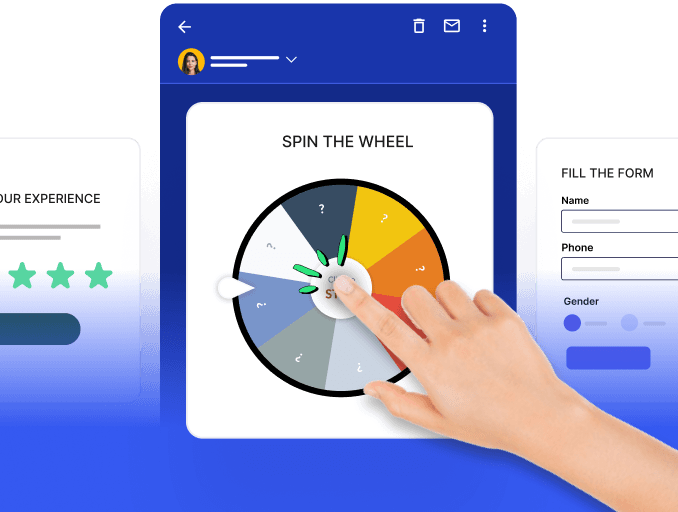AI has become integral to various industries and transformed how businesses operate today. If we speak about AI for sales, the emerging technology has enhanced sales processes, personalized customer interactions, and ultimately increased sales conversions.
This article will cover how sales professionals, managers, and BDRs can implement AI to drive more sales conversions.
Table of contents
Implementing AI for sales
Implementing AI in sales offers numerous benefits. Some key advantages include enhanced lead management, personalized customer interactions, sales process automation (of tasks such as data entry, lead nurturing, and sales forecasting), data-driven insights and effective sales strategies.
AI enables predictive analytics that uses statistical models to analyze historical data and forecast future outcomes. In sales, predictive analytics can help identify potential customers, predict customer behavior, and optimize pricing strategies.

Source: AI for sales
Chatbots and AI-powered virtual assistants, such as Zia by Zoho, can also handle customer inquiries, provide personalized recommendations, and assist in sales. They can offer round-the-clock support, improving customer satisfaction and sales conversions.
Elite Sportswear, LP maximized its outreach by using an #AI Virtual Sales Assistant, leading to an increase in revenue and better customer experience.
— Exceed.ai by Genesys (@exceedai) January 6, 2022
Thank you Nina Won for being such a great sport 🏆🙏#aiforsales #customerexperiencehttps://t.co/v6YIdiCEEW
Related guide: How AI in B2B Marketing Can Be a Game Changer for Marketers
Applications of AI in sales
1. Lead generation
1. Prospecting: AI tools can provide valuable insights for sales intelligence and prospecting. For example, tools like LinkedIn Sales Navigator leverage AI algorithms to identify potential leads based on specific criteria such as job titles, industries, and company size.
2. Personalized email outreach: AI can help the sales teams to craft personalized email campaigns. Tools like Warmer.ai help in drafting personalized email copies. Alternatively, one can also use ChatGPT or Lavender AI to write creative copies.
These AI-based platforms use millions of data points, like on-site interactions, previous communications, and purchase history, to build specific customer personas. Using these customer personas, marketers can align the customers with the relevant products or services that have more likelihood of conversion.
Let's take, for instance, Netflix's recommendation engine. Netflix utilizes an AI-enabled recommendation engine to generate leads and increase customer retention. By analyzing historical and real-time data, the recommendation engine provides personalized recommendations to users, saving them the time and effort of choosing what to watch. This highly targeted approach increases customer satisfaction and encourages users to continue using the platform, ultimately leading to more subscriptions and revenue for Netflix.
2. Lead qualification
1. Predictive lead scoring and automated qualification: AI-based sales tools can automate marketing campaigns and qualify leads, saving time for sales staff. By leveraging predictive lead scoring algorithms, an AI-based sales platform can analyze data and categorize prospects into hot and cold leads based on pre-determined questions and specific requirements. This allows salespersons to focus on hot leads with relevant information, increasing the chances of capturing their interest and improving lead qualification efficiency.
2. Deployment of chatbots: Chatbots are deployed in sales and marketing to handle customer service, lead generation, and lead qualification tasks. Chatbots save businesses time and resources by answering straightforward and repetitive queries. They can also be trained to ask pre-determined questions to qualify leads and gather specific information.
Chatbots enable instant support and filter out support tickets, allowing sales teams to focus on more complex queries and better utilize their time. This improves efficiency, reduces costs, and creates a more efficient and satisfied workforce.
For example, chatbot platforms like drift provide automated conversational interfaces that can handle initial lead interactions, saving time for sales reps.
3. Lead acquisition
AI can assist in identifying and acquiring new leads through various channels. For instance, many AI-powered social media monitoring tools can track customer conversations and keywords relevant to a business. This enables sales teams to engage with potential leads and drive maximum conversions.
4. Lead nurturing
1. Automated email campaigns: AI can automate personalized email campaigns based on customer interaction and preferences. SDRs can use AI tools for segmenting leads, delivering tailored content, and effectively tracking engagement to nurture leads.
2. Upselling & Cross-selling: AI can analyze customer purchasing patterns and preferences to identify opportunities for upselling and cross-selling. Amazon's recommendation system is a prime example of how AI can suggest relevant products based on customer browsing and purchase history.
Related guide: 10 AI Tools for Small Businesses to Make Teams More Efficient
5. Sales forecasting
1. Data-driven sales projections: AI-powered predictive analytics can analyze historical data to forecast sales performance and predict customer churn ratio. Businesses can take proactive measures for retaining customers by identifying factors that contribute to churn.
2. Identification of sales trends and patterns: AI algorithms can analyze large volumes of data to identify sales trends and patterns. For example, the pricing optimization tools use AI to suggest relevant pricing models based on factors such as market demand and competitor pricing.
6. Sales process optimization
1. Intelligent sales automation: AI can automate repetitive sales tasks, such as data entry and follow-ups, allowing sales reps to focus on more strategic activities.
2. Workflow optimization and task prioritization: AI-powered tools like Clari analyze data from various sources, including CRM systems and email communications, to provide insights and recommendations on task prioritization, ensuring sales teams are focused on the most critical activities.
“AI for sales is still in its infancy, but B2B CIOs should start their path now and adapt as new trends and technologies arise. If deployed correctly, AI can automate almost half of administrative sales work, point sales reps to the most lucrative deals and foster a better relationship with existing clients. It’s a perfect addition to any B2B sales organization.”
-Ilona Hansen, Senior Director Analyst, Gartner
7. Customer relationship management (CRM)
1. Personalized customer interactions: AI can analyze customer data to personalize interactions and tailor offerings based on individual preferences. For instance, CRM systems use AI to provide sales reps with real-time insights and recommendations for personalized customer engagement.
2. Churn prediction and proactive retention strategies: AI algorithms can analyze customer behavior, historical data, and external factors to predict the likelihood of churn. This enables sales teams to proactively engage with at-risk customers and implement retention strategies in advance to prevent churn.
8. Improve post-sales experience
1. Prescriptive analytics: AI can provide prescriptive insights to enhance the post-sales experience. For example, AI-powered analytics tools can analyze customer feedback, usage data, and support interactions to provide recommendations for improving customer satisfaction and driving upsell opportunities.
Rolls-Royce, a leading aerospace and defense company, uses AI-powered predictive maintenance analytics. They collect data from sensors embedded in their aircraft engines to monitor performance and identify potential maintenance needs in advance. This proactive approach allows Rolls-Royce to optimize its sales processes, improve customer experience, and further provide value-added services to its clients.
With the help of AI-powered tools and technologies, sales teams can leverage data-driven insights, automate repetitive tasks, personalize interactions, and optimize sales strategies to improve the conversions and business growth.
Subscribe to the Mailmodo Bulletin
12k marketers get these growth tactics in their inbox
Challenges in AI for Sales
1. Data privacy and security
1. Ensuring compliance with data protection regulations: Implementing AI in sales requires handling and processing customer data. Organizations must adhere to data protection regulations such as the General Data Protection Regulation (GDPR) and other laws to ensure customer data is handled securely and with consent.
2. Safeguarding customer information: With AI-driven sales processes, there is a need to safeguard customer information from unauthorized access, data breaches, or misuse.
Robust security measures, encryption protocols, and access controls must be implemented to protect sensitive customer data.
2. Transparency
1. Interpretable AI models and decision-making processes: AI models used in sales should be transparent and interpretable. Sales professionals must understand how AI algorithms make decisions, which factors are considered, and the reasoning behind recommendations. It promotes trust and confidence in the AI system.
2. Avoiding biased or discriminatory outcomes: AI algorithms can inadvertently reflect biases in the data they are trained on. Sales organizations must ensure that AI systems do not perpetuate biases or discriminate against certain groups. Regular monitoring, bias detection, and mitigation strategies should be implemented to address potential biases.
3. Human-AI collaboration
“AI augments sales staff, but does not replace them. What it will do is reduce administrative sales work to give sellers more time to prospect, find new revenue and upsell existing clients.”
- Ilona Hansen, Senior Director Analyst, Gartner
1. Augmenting human sales efforts with AI: The goal of AI in sales is to enhance human capabilities, not replace them. Finding the right balance between human expertise and AI capabilities is essential. Sales professionals should be trained to effectively collaborate with AI tools, leveraging their insights to make informed decisions and provide personalized customer experiences.
AI-powered tools like conversica support sales teams by automating routine tasks, identifying promising leads, and generating personalized messaging. It allows sales professionals to focus on building relationships and closing deals.
2. Ensuring AI supports, rather than replaces, human sales professionals: It is crucial to avoid creating a perception that AI will replace sales professionals. Organizations should emphasize that AI is a tool to support sales teams by automating repetitive tasks, providing data-driven insights, and enabling more efficient processes. It helps alleviate concerns and ensures a smooth integration of AI into the sales workflow.
4. Data quality and availability
AI relies on high-quality data for accurate predictions and recommendations. However, sales data can be fragmented, incomplete, or of varying quality. Sales organizations must ensure data cleanliness, consistency, and accessibility to maximize the effectiveness of AI tools and algorithms.
5. Building rapport and trust
Building rapport and winning customer trust is fundamental to sales success. While AI can assist in personalization, there is a challenge in ensuring that AI-powered interactions maintain a human touch. Sales teams need to make an effort to strike the right balance between using AI-generated insights and maintaining authentic human connections with customers.
6. Handling objections and rejections
AI may not always provide the perfect solution, and customer objections or rejections can still arise. Sales professionals must be prepared to handle these situations, leveraging their expertise, empathy, and problem-solving skills to address customer concerns and overcome objections.
Addressing these challenges in AI for sales is crucial for successful implementation and integration. By prioritizing data privacy, transparency, human-AI collaboration, data quality, rapport-building, and objection handling, organizations can navigate the complexities and leverage the benefits of AI to drive sales effectiveness and customer satisfaction.
AI sales tools
If you're keen on learning more about the popular AI tools for sales, then do check out this guide: 15 Best AI Tools for Sales Every SDR Should Know About
In the guide, we've compiled the list of the 15 best AI tools for sales and elaborated more on the key features and pricing to help SDRs make a good choice.
- Humantic.AI
- Tact.ai
- SalesDirector.ai
- Exceed.ai
- Conversica
- PaveAI
- Warmer.ai
- Outreach
- People.ai
- Drift
- Salesbox AI
- Clari
- Regie AI
- CoPilot AI
- Seamless.AI
Related guide: 14 AI Marketing Analytics Trends to Expect in 2023
Wrap up
In conclusion, AI for sales offers a great opportunity for businesses to streamline their operations, optimize sales performance, and achieve higher conversions. Organizations that embrace AI for sales can gain a competitive edge in the marketplace by delivering personalized, targeted sales strategies and cultivating stronger customer relationships.
However, it is important to note that while AI can greatly enhance sales processes, it should not replace human touch and expertise. The combination of AI technology and human sales professionals working collaboratively can yield the best results, allowing for the personalization and empathy that is often essential in sales interactions.
What you should do next
Hey there, thanks for reading till the end. Here are 3 ways we can help you grow your business:
Talk to an email expert. Need someone to take your email marketing to the next level? Mailmodo’s experts are here for you. Schedule a 30-minute email consultation. Don’t worry, it’s on the house. Book a meet here.
Send emails that bring higher conversions. Mailmodo is an ESP that helps you to create and send app-like interactive emails with forms, carts, calendars, games, and other widgets for higher conversions. Get started for free.
Get smarter with our email resources. Explore all our knowledge base here and learn about email marketing, marketing strategies, best practices, growth hacks, case studies, templates, and more. Access guides here.







